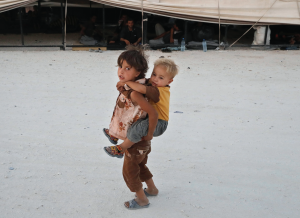INTELBRIEF
February 8, 2018
TSC IntelBrief: Growing Horror in Syria

- The suffering in Syria has exploded in scale and depth in recent weeks, as the Assad regime moves to militarily end the war.
- On February 6, air and artillery strikes killed at least 80 civilians in the besieged Damascus suburb of Eastern Ghouta, while no aid deliveries in these areas have been approved for months.
- The air strikes escalated after the February 2 downing of a Russian fighter jet and the killing of the pilot.
- The UN, which has been unable to do much to relieve the suffering in Syria, is expressing increasingly desperate frustration at the humanitarian crisis in the country.
The war in Syria has been raging for so long, the world has become blind to the continuing—and lately increasing—atrocities and suffering plaguing the country. Yet for the Syrian people, there is no escape from the daily misery and pain inflicted upon them by regime and rebel forces alike. The war has proved that a situation seemingly at rock bottom can always get worse.
The January 30 ‘peace talks’ in Sochi, Russia, failed to bring about any meaningful dialogue between the Assad regime and the splintered rebels; in fact, the regime positions have hardened as their military fortunes have improved, with no talk of a new constitution or replacing Assad. The Sochi talks exposed the failure of the international community to successfully broker a peace deal—or even the start of a deal—despite the supposed political will of the world’s great powers to do so.
On February 6, regime air and artillery strikes killed at least 80 civilians in the besieged Damascus suburb of Eastern Ghouta. While the area has successfully held out against the regime, the recent increase in military pressure, on top of years of deprivation and suffering, is pushing Ghouta to the brink of collapse. There are also verified reports that the regime once again engaged in war crimes, using chlorine gas as a weapon. The chlorine attacks occurred in Ghouta and in the town of Saraqeb, in Idlib province.
Russia has also dramatically stepped up its air strikes after the February 2 downing of a Sukhoi Su-25 aircraft by rebels belonging to Hayat Tahrir al-Sham, an al-Qaeda affiliated group. This is the first time since Russia began direct air support for the Assad regime in 2015 that the rebels managed to shoot down a jet. In some of the largest air strikes of the war, Russian jets and bombers pounded the area around Saraqeb, killing at least 16 people over the weekend.
Meanwhile, Turkey continues its limited invasion of northern Syria to dismantle the armed Kurdish presence there, creating an increasingly tense situation with the U.S., which supports the Kurds as part of its anti-Islamic State coalition. The U.S. is trying to maintain a lasting presence in Syria even after the military defeat of the Islamic State in order to counter Iranian influence in Syria. The war in Syria has always been an intensely local affair made far worse by external actors. That dynamic shows no sign of abating; in fact, external machinations and meddling will likely increase as the regime slowly grinds down the opposition.
Recently, the regional humanitarian coordinator for the Syria crisis, United Nations Assistant Secretary General Panos Moumtzis, shared his frustration at the UN’s complete inability to sway decision-makers, and at the general failure of humanitarian diplomacy. The frustration of negotiators is more than matched by the hopelessness of Syrians experiencing yet another spike in violence after so many years of war and degradation.
For tailored research and analysis, please contact: info@thesoufancenter.org
[video width="960" height="540" mp4="https://thesoufancenter.org/wp-content/uploads/2018/02/Final-Edit-1-127.mp4" poster="https://thesoufancenter.org/wp-content/uploads/2018/02/AP_17206271125257.jpg"][/video]